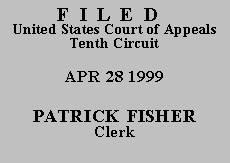

| MARSHALL HENRY ELLIS, | No. 98-6016
(D.C. No. CIV-97-1274-R) |
Petitioner Marshall Henry Ellis, a state prisoner represented by counsel, appeals the district court's dismissal of his 28 U.S.C. § 2254 habeas petition for untimeliness. We grant Mr. Ellis' request for a certificate of appealability and reverse.
Mr. Ellis was convicted of first degree murder and shooting with intent to kill and was sentenced to both life and fifty years imprisonment. His conviction was affirmed by the Oklahoma Court of Criminal Appeals on April 10, 1990, but the United Sates Supreme Court granted his petition for certiorari and remanded the case for further consideration. On remand, the Court of Criminal Appeals reaffirmed his conviction on May 20, 1992. The United States Supreme Court denied certiorari on November 9, 1992.
Mr. Ellis filed for state post-conviction relief on April 16, 1997. The state post-conviction trial court denied the petition on April 28 and eight days later, on May 6, 1997, Mr. Ellis filed an appeal to the Oklahoma Court of Criminal Appeals. That court affirmed the denial of post-conviction relief on August 5, 1997. Mr. Ellis filed his federal habeas corpus petition on that same day. The federal district court adopted the recommendation of the magistrate judge and dismissed Mr. Ellis' petition as untimely.
Pursuant to the Antiterrorism and Effective Death Penalty Act of 1996 (AEDPA), 28 U.S.C. § 2244(d)(1)(A), a state prisoner has one year from the date on which his conviction becomes final to file an application for a writ of habeas corpus in federal court. However, the one year period is tolled during the time a properly filed application for state post- conviction relief is pending. Id. § 2244(d)(2). In situations such as Mr. Ellis' where a state conviction became final prior to AEDPA, this circuit has created a judicial grace period that runs for one year from the enactment of AEDPA, April 24, 1996, through April 23, 1997. See United States v. Simmonds, 111 F.3d 737, 744-46 (10th Cir. 1997) (applying same rule to parallel one-year statute of limitation for federal post-conviction relief under 28 U.S.C. § 2255); Hoggro v. Boone, 150 F.3d 1223, 1226 (10th Cir. 1998) (section 2244).
Mr. Ellis contends the district court was incorrect in holding that the tolling provision of AEDPA for pending state habeas cases does not apply to the judicially created grace period, and that it therefore erred in dismissing Mr. Ellis' petition for federal habeas relief as untimely. We agree. In reversing the district court, we note that it did not have the benefit of our opinions in Hoggro and Barnett v. Lemaster, 167 F.3d 1321 (10th Cir. 1999). In Hoggro, 150 F.3d at 1226, we held that a petitioner's state post-conviction application initiated during the one-year grace period tolls the period of limitation. In the instant case, Mr. Ellis filed a petition for state post-conviction relief on April 16, 1997, seven days before the expiration of the judicial grace period. Pursuant to Hoggro, the period of limitation was suspended on April 16, and Mr. Ellis is entitled to the benefit of those additional seven days.
The issue then becomes whether the clock starts and stops between each step of a post-conviction application. The state suggests that it does, asserting that Mr. Ellis' petition was untimely despite Hoggro. Although the state concedes Mr. Ellis had seven days left, it contends the clock ran out during the interim eight days between the state court's post-conviction denial on April 28, 1997, and the filing of Mr. Ellis' appeal of the denial on May 6, 1998.
The state is incorrect. We made it clear in Barnett that the clock restarts only after the final resolution of the post-conviction application. We said there that the time tolled "encompass[es] all of the time during which a state prisoner is attempting, through proper use of state court procedures, to exhaust state court remedies with regard to a particular post-conviction application." 167 F.3d at 1323.
In the instant case, the one-year period of limitation was tolled on April 16, 1997, when Mr. Ellis timely filed for post-conviction relief, seven days before the grace period expired. Only after the Oklahoma Criminal Court of Appeals denied the application on August 5, 1997, did the clock begin to run again. From that time, Mr. Ellis had seven days to file a federal habeas petition or until August 12, 1997. Since Mr. Ellis filed for federal habeas relief on August 5, 1997, his application was timely.
We REVERSE the judgment of the district court and REMAND for further proceedings.
ENTERED FOR THE COURT
Stephanie K. Seymour
Chief Judge
*.This order and judgment is not binding precedent, except under the doctrines of law of the case, res judicata, or collateral estoppel. The court generally disfavors the citation of orders and judgments; nevertheless, an order and judgment may be cited under the terms and conditions of 10th Cir. R. 36.3.